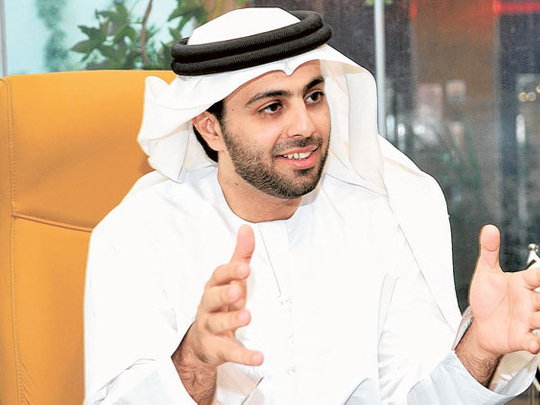
Dubai: Dubai Internet City (DIC) is attracting about 14 new investors every month, and the number of companies has reached more than 1,400 in recent months, a top official said.
"Last year, 169 new companies registered with us despite the economic downturn. This reflects the resilience in the information and communication technology (ICT) sector," Malek Sultan Al Malek, Managing Director of Dubai Internet City and Dubai Outsource Zone, told Gulf News in an exclusive interview.
"Throughout the last decade we have managed to create a vibrant ICT cluster that is growing."
As long as businesses continue to operate, companies in the ICT sector will remain in business as they provide the engine that fuels organisations. In a more globalised world where companies outsource services, ICT provides the necessary tools for businesses to maximise efficiency and strengthen companies' bottom line.
Dubai Internet City was launched in 2000 as part of the emirate's plan to help reshape the ICT sector and develop a strong knowledge cluster so that it could bring creative solutions for businesses.
Later, Dubai Media City, Knowledge Village, Dubai Studio City and Dubai Outsource Zone (DOZ) were announced as part of a vision to transform the emirate's economy, historically dominated by trade, to a knowledge-base one.
Now, 11 years later, more than 25,000 workers from 150 countries work in DIC. Although it largely remains a real estate cluster hosting ICT companies, far-reaching technological innovation is yet to be seen by software and hardware developers or research and development organisations — something DIC wants to change in the coming years.
In an exclusive interview Al Malek explains the latest developments in DIC and DOZ and the ICT sector at large. Excerpts:
Gulf News: Although the Dubai Internet City is a good premises, it largely remains a collection of real estate. We haven't seen much innovation coming up from companies registered with the DIC. Why is that?
Malek Sultan Al Malek: That's not completely true. We have a number of successful home-grown companies that have made it big. Maktoob.com, for example, has been one of the most successful companies which has grown out of the Dubai Internet City — it has been acquired by Yahoo!
Similarly, there are plenty of companies that made it big and helped create regional growth, local skills development, employment and innovation in the region.
Today, DIC is a thriving community with lots of activities.
Could you elaborate on your successes? We do not see much research and development activity here. Is it in line with the government's expectation?
It is imperative that any industry has to go through an evolution and various phases of growth and development. ICT has grown faster than other sectors and been able to contribute to the economy as well as create innovation.
Even last year, this was evident with the number of companies joining the cluster. Before that, despite the global economic downturn, the numbers have grown. In 2010, we had 150 business partners join both clusters while this year it was 169.
There was an average of 14-16 companies joining Dubai Internet City and Dubai Outsource Zone per month in 2011. Therefore we currently host more than 1,400 companies in DIC.
How has the economic slowdown affected the ICT and the outsourcing sector?
This is an emerging market. During the last four years, we have been able to create value for the industry. Even during the economic downturn, and despite the industry being affected, both clusters witnessed growth. New companies are opening and expansion of offices are still happening at both Dubai Internet City and Dubai Outsource Zone. This positive sign of growth was due to a number of factors like competitive rates, conducive ecosystem and the proximity to a larger market in the region.
What are you doing to support small and medium entrepreneurship? Do you have a business incubation?
Yes, last year we announced the Shaikh Majid Bin Mohammad Innovation Centre In5 to promote entrepreneurship and technical innovation in UAE.
Tecom Investments and Dubai SME also signed an MoU this year to develop the SME sector with a view to encourage entrepreneurship among UAE nationals, and furthering the sector's contribution to the country's economy.
The collaboration between Tecom Investments and Dubai SME will encourage Emiratis who are members of Dubai SME to register and set up offices within Tecom free zones. The companies will receive opportunities to gain an insight and increase industry knowledge as part of the Tecom ecosystem.
Anyone with a great idea could approach us for support and we will support the entrepreneur, help them to develop a sustainable business plan and help nurture it till it starts delivering services. If it is good and could be put to business, then we are there to help.
What about financial support? Do you license venture capital funds?
Although we do not issue licences to venture capitalists — they could seek licences from financial free zones, such as the Dubai International Financial Centre — we however, do support entrepreneurs by connecting them with venture capitalists.
Democamp Dubai was an initiative from the ICT cluster which brought together VCs [venture capitalists] and investors on one platform with young innovators and entrepreneurs. This event helped the best idea or innovation receive funding from investors for future growth or being launched in the region.
Yebab.com was one of the participants at Democamp Dubai and raised its first round of investment from this event. Revenue has nearly doubled while traffic has increased tenfold in 2011 compared to the previous year.
Going forward, what are your plans for Dubai Internet City and Dubai Outsource Zone?
One of our main focus areas this year is the SME segment while the other growth areas for Dubai Internet City are telecommunications and networking, as well as software, Internet and multimedia.
DIC is always looking to create a better environment for entrepreneurship, and therefore, SMEs are a focus moving forward especially with our partnership with Dubai SME which synergises our strength to support Emirati start-ups in the ICT sector.
Last year, we invested in an ICT business incubation programme for young entrepreneurs with the announcement of the Shaikh Majid Bin Mohammad Innovation Centre In5.
Additionally, in terms of new companies making an entry in the region, our target markets will be mainly US and UK.
Dubai Outsource Zone will continue to be a one-stop-solution for industry players and create an environment where they are able to reach out to specialists in the sector.
How successful has Dubai Outsource Zone been in the region as a cluster especially when Dubai is considered as an expensive option compared to global and regional counterparts? How will this help outsourcing growth in the country especially Dubai Outsource Zone?
DOZ can complement a lot of gaps in big BPO [business process outsourcing] markets like India and China, and in areas like infrastructure, lifestyle and workforce attrition. The clusters are not competing with these big BPO markets, but instead providing an alternate outsourcing destination that complements the large BPO markets in the world.
India and China target the mass markets — it caters to everything, whereas we're trying to focus here on a niche, high-end market. Dubai has the ability to offer multi-lingual services because of the diverse talent available here — DOZ is home to personnel from almost 60 nations.
What is the size of the outsourcing industry in the UAE? How do you compare this to global and regional markets?
The outsourcing industry is embarking on a growth path with global revenues projected to touch $479.3 billion (Dh1.76 trillion) by 2016 from $370 billion at present, according to a report issued by Dubai Outsource Zone in collaboration with global business research and consulting firm Frost & Sullivan.
The compound annual growth rate (CAGR) of global outsourcing markets will be at 8.35 per cent, while the Mena region is expected to touch 8 per cent during the forecast period (2009-2016). The UAE outsourcing market's CAGR will be 10 per cent during the same period. The industry's steady growth trend is attributed to the change in business practices, and has occurred as a result of the hard lessons learnt from the financial crisis. As a result there is now an increased focus on the reduction of Opex [operational expenditure] and outsourcing is an obvious option.
Where do you see this growth coming from in the UAE? What sectors are contributing to this growth?
At present Dubai accounts for over 90 per cent of the outsourcing market in the UAE, according to Frost and Sullivan. Prevalence of multinational organisations in Dubai vis-a-vis the other emirates, means that it makes more sense to establish outsourced operations here due to the close proximity to other operational entities. The UAE market is primarily focused on the provision of customer support in financial services, telecom, travel and hospitality sectors.
Dunia Finance and Back Office are two good examples of companies that have utilised outsourcing services effectively in the country. In the region, governments are expected to be the biggest users of outsourcing services because there is an increased investment in e-government services and alternative channels in which services can be delivered to citizens.
The UAE is expected to follow the general Mena trend and see a greater uptake of outsourcing services by the health care sector. Jumeirah Group has opened a call centre in DOZ to support its expanding business operations while Emirates airline has decided to set up a call, contact and data centre at the cluster.












